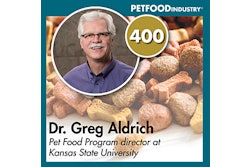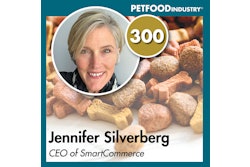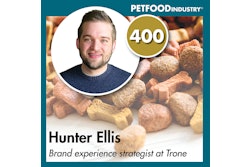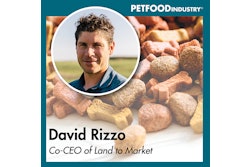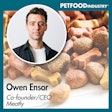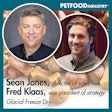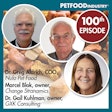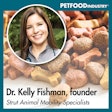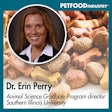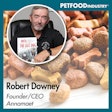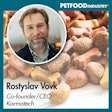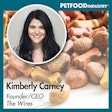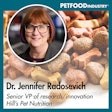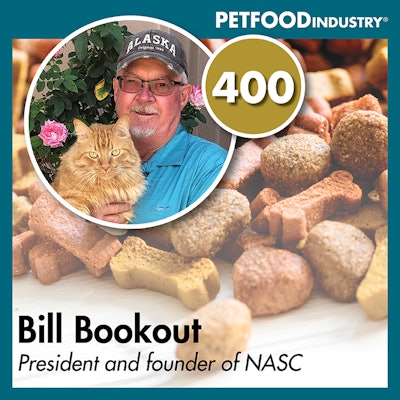
Supplements are becoming an increasingly important product in the pet parent's arsenal of health and wellness tools for their pets. I spoke with National Animal Supplement Council President and Founder Bill Bookout to get his take on the current landscape and what's to come for pet supplements.
The below transcript is from Episode 28 of the Trending: Pet Food podcast, where I spoke with President, Board Chairman and President of the National Animal Supplement Council (NASC) Bill Bookout about the state of supplements in the pet industry. You can find the episode at www.PetfoodIndustry.com/trending-pet-food-podcast, on SoundCloud or on your favorite podcast platform. This episode originally aired on February 15, 2023.
(We want to thank AFB international for sponsoring this podcast. AFB is the premier supplier of palatants to pet food companies worldwide, offering off-the-shelf and custom solutions that make pet food, treats and supplements taste great.)
Lindsay Beaton – Editor, Petfood Industry magazine and Host, Trending: Pet Food podcast Hello, and welcome to Trending: Pet Food, the industry podcast where we cover all the latest hot topics and trends in pet food. I’m your host and editor of Petfood Industry magazine Lindsay Beaton, and I’m here today with President, Board Chairman, and founding member of the National Animal Supplement Council Bill Bookout.
Hi Bill, and welcome!
Bill Bookout – President, Board Chairman and Founder, NASC
Hi, Lindsay. Thank you very much. It's a pleasure to be here.
Beaton: Odds are if you’re involved in animal supplements you’re familiar with Bill, but just in case here’s what you need to know. He’s been an advocate for the animal supplement industry for over two decades and is a recognized leading expert on regulatory issues surrounding these types of products. He has testified on behalf of the industry at FDA public meetings, served on the Health Canada Expert Advisory Committee for Veterinary Natural Health Products, has appeared on Pet Age magazine’s 2021 and 2022 Power 50 list of pet industry leaders, and has participated in countless educational programs, legal forums, regulatory trainings and professional meetings. Bill earned his Bachelor’s of Science degree in physical sciences from the University of Wyoming and his MBA from the Pepperdine University Presidents and Key Executives program.
The mission of the National Animal Supplement Council is twofold: to promote the health and well-being of companion animals and horses that are given animal health supplements by their owners, and to protect and enhance the animal health supplement industry.
Members of the NASC are concerned and committed providers of animal health supplements from around the world. Together they endeavor to improve the quality and consistency of these products sold to consumers for the benefit of their dogs, cats, horses and other companion animals. NASC member companies collectively address issues and affect important change, which ultimately elevates the industry and results in better practices, procedures, and products.
Bill’s extensive experience in all things animal supplements makes it a no-brainer to have him on to help me answer today’s question: What is the current and future landscape of supplements in the pet industry?
Bookout: That's a great question that's often misunderstood or misinterpreted, so I think it's beneficial just to have a brief background of the pet supplement industry, how its evolved and how we've come to be in the position that we are today, which sets the stage for any forward-looking events or outlook for the industry. When the Dietary Supplement Health and Education Act was passed and signed into law by Congress in 1994, FDA Center for Veterinary Medicine published an opinion in the Federal Register in 1996 that said, in the opinion of the agency, that Congress did not intend that legislation to apply to animals, so any animals including companion animals. So that's often misinterpreted, and even still today, over 20 years later, there's no category for dietary supplements for animals like there is for people; that's often misunderstood. NASC was formed in 2001 with a lack of success of any committee developed by AAFCO, defined by AAFCO, to try and identify a path forward. So NASC was formed to engage the regulatory officials at the state and federal levels to try to identify and define a path forward that was responsible and would be beneficial for all stakeholders, industry retailers and, not least Importantly, the animals themselves. Over 20 years, that's exactly what we've done. Nobody gave us a real significant chance for success; even I had my doubts in the beginning. When we originally formed NASC, which was 18 companies — we now represent over 300 brands and we have complete supply chain management.
So to jump forward and fast forward, our systems and programs have really been developed, working with and cooperating with the regulatory agencies, transparently with the regulatory agencies, both state and federal, as well as organizations like AAFCO that recommend regulatory policy. I tell you that, so what's the current landscape of the industry and what's the outlook? When we started — and our scope is limited to only dogs, cats and horses, non-human food chain animals, that's our focus and that's where we stay. We don't do complete balanced diets. We only do supplements, whether they're for a health purpose — and I'll talk more about that— or a nutritional benefit as a nutritional supplement. But when we started NASC the total consumer spending in the industry was estimated at about US$800 million. Now it's about US$3.2 billion for dogs, cats and horses in consumer spending. And there haven't been any significant negative events that carried significant health consequences that required regulatory intervention like the melamine issue that occurred back in 2007–2008. You know, we're very proud of our accomplishments, we've worked with the regulatory agencies.
But again, what's the current landscape of supplements, to your original question? I think it's stable, I would say growing, and it's a responsible path forward. And that's a credit to the industry, as well as the regulatory agencies and also AAFCO. So I always thank the regulators, because without their knowledge and support of these programs, we would not be where we are today.
Beaton: We're going to dive deeper into what's going on right now in the supplement space. But it's not often you get to discuss history with one of the sources of that history, so I want to go back in time a little bit to when the NASC was started and when you were getting things off the ground. You said you had doubts that it was going to work out: What were some of the initial challenges or pushback in creating this agency that you did?
Bookout: The motivation, and I think part of the success, for NASC is we basically were threatened. Products were being threatened with removal from the marketplace. And so we were in a position where we had no choice; we had to act. Now one might say, “Well, why didn't you just go to Congress and pass legislation like they did for human dietary supplements?” And the reason that is, is because one of the significant differences in our industry is we're regulated to two levels potentially: We’re regulated at the federal level by the FDA Center for Veterinary Medicine and also at the state level, through the appropriate agency that's responsible for regulating either animal remedy products or animal nutritional supplements (usually a Department of Agriculture, but it can be other areas depending on the state).
So, though the motivation for starting NASC was the industry was really threatened, Lindsay, and to the question of why did I have my doubts? So imagine this in your mind's eye: We have 26 companies in April that decide to meet face-to-face in Chicago in 2002, and say, “What are we going to do? And how are we going to go forward?” And I stand up in front of the room and I say, “Listen, this is what we're going to do. We're going to engage the regulatory officials cooperatively at the state and federal level; we're going to develop good manufacturing practice standards; we're going to develop claims guidance that’s truthful, not false and misleading to the consumer; we're going to develop a system of post-market surveillance so we can monitor what's happened to products after they enter the marketplace and the channels of commerce as an early warning system. And we're going to do all this, and the regulators are going to work with us and we'll be successful. Who's with me?” You can imagine how many hands were raised in that room. In fact, 26 companies originally attended that meeting. Only 18 of them stuck with us and formed the foundation for a document long-ago submitted called Compliance Plus (it’s been upgraded significantly since that time), but of the companies that didn't stick with the NASC, every single one of them is out of business today — not a single one survived.
So I think one can always have your success judged by your accomplishments and results. And I don't mean to sound egotistical, but I'm very proud of our results. And I think that our results stand alone as a model of how industry can work very successfully with regulators to achieve optimal outcomes. Why did I have my doubts with that? I think, for anybody that's been in the industry and attended regulatory meetings, I think it's an accomplishment that I believe, Lindsay, really stands alone in the industry. And I don't mean just the animal supplement or pet food industry, I mean any industry,
Beaton: I would say that's a pretty significant accomplishment.
Bookout: Oh, thank you. We think so. And again, I think our results back that up.
Beaton: Does the NASC now look the way that you expected it to look when you started it 20 years ago?
Bookout: Well, I think it looks the way we hoped that it would look. Certainly there have been things that we have known and learned over time that we've incorporated into our platforms. Let me give you an example: When the Food Safety Modernization Act was considered and passed, it really put the focus on upstream supply chain management — qualification of raw materials, verification of suppliers. It underpins the statement that quality is always a journey and never a destination, it's a process of continuous improvement. So certainly, the fundamentals that we started with at NASC were consistent labeling guidelines for two categories of product: Either a nutritional product or a product that is not intended for a nutritional health benefit. Claims guidance, post-market surveillance, but also we've extended our purview and qualification process upstream to contract manufacturers and raw materials suppliers, because unless you start with a quality raw material or quality raw materials combined by quality, repeatable processes documented by quality control procedures, you're not going to have a quality product at the end of the production cycle. Those things we certainly didn't initially envision and anticipate, but we've incorporated those because, again, we embrace a philosophy of continuous improvement. Because we always know more tomorrow or next week or next month or next year than we knew today, right? So that's why CGMPs are referred to as current GMPs, because it's never static.
Beaton: I love a good origin story, so we could be here all day talking about the history of NASC. But I want to jump forward to the present, because there's a lot going on in the supplement space right now, perhaps more than there ever has been, because pet owner needs are becoming more complex. They are increasingly incorporating supplements into their nutrition plans for their pets; it's just becoming a more integral part of the pet food experience, I think in a way that it wasn't necessarily even when the NASC started. What is the hottest topic right now in pet supplements? What is everybody talking about; what's on your radar?
Bookout: So a couple things. One, CBD and hemp continue to be hot topics. There are many parallels between CBD and hemp and also many parallels in terms of misunderstandings for CBD and hemp from the time the original Farm Bill was passed — and then the second iteration was passed in 2018, the Agriculture Improvement Act, that people think that because the Farm Bill was passed that legalized products. It did not. It legalized growing the agricultural commodity hemp, but it did not legalize products. So your transition from the Department of Agriculture and an agricultural commodity to an article of commerce, which is U.S. FDA and state regulatory agencies, and these ingredients are not presently approved for use in animal food, either hemp or CBD. And FDA maintains that, and they've been very consistent in what they've said. But a lot of people think that the Farm Bill made hemp legal in animal food or pet food especially. And that's simply not the case; it didn't. So hemp and CBD are topics just to comment on where that's going. And I've said this, as I testified at FDA and their public hearings, and there, again, many parallels between CBD and hemp as what existed previously in 2001–2002 for the rest of the supplement industry, if you will. Unapproved ingredients but lack of regulatory enforcement has caused significant consumer demand and many, many products from many, many companies to be proliferated in the marketplace and really all channels to market. And so you've got an industry that's been let develop in spite of the fact that these ingredients are not approved. So I've had conversations with the regulators that now this horse is out of the barn. And we're going to have to figure out a way to deal with these substances responsibly. So there are ingredient definition approval processes or other approvals in progress for hemp in pet food and animal food in general.
CBD, I've said this in the past and some people don't like to hear this, but in my opinion I don't think CBD will ever be approved as an ingredient for use in pet food, because in all the research and all the associations or meetings that I've participated in discussing the topic, including regulatory meetings, I don't think there's any scientific substantiation that CBD provides a nutritional benefit. Hemp certainly does provide the potential for great nutritional benefits. It's a sustainable crop, it contributes in a lot of other ways [as a] protein source, fiber source, essential fatty acids through hemp seed oil for omega-three, -six and -nine. So that's going to happen, but right now it's an unapproved ingredient.
Why is that a hot topic? Really inconsistent enforcement has let the industry develop. So you have states like Idaho, or other states that pass legislation that creates a one-off regulatory environment for a national industry. Well, I don't have to tell people that listen to this podcast that it's very difficult for a national industry to operate under potentially 51 different sets of rules and regulations. It's just not practical. Anyway, I think that's a hot topic right now in the industry.
Other hot topics are, everybody's looking for the next big thing, right? I think there's a lot of ingredient research in terms of functional and beneficial ingredients. The, dare I say, slow, methodical approval process for an ingredient to be approved for use in animal food is frustrating. And there's a balance, right? I mean, you want a product that's produced consistently and has nutritional benefit, and also you're sure is safe, combined with industry desire to move quickly, so you know the speed at which new ingredients can be approved and the claims associated with those ingredients. I think those are hot topics in the industry.
Beaton: I want to stick with CBD for just a minute, because I want to know: As somebody who has been doing this and has as much knowledge as you do, has there ever been anything quite like CBD in terms of becoming an industry trend and getting out there and being in products to the point where regulatory can't pull it back, but also hasn't moved forward? Is there precedent for the situation that CBD is in right now? Or is this just something that you've kind of been watching shaking your head going, “You can’t, it's too late. It's already — it's already out there.
Bookout: Excellent question. Is there a precedent? Can we look to other something else and say there's a parallel here that would be equivalent or comparable to CBD? And I think the short answer to that is no. The animal industry is a fast-follow industry. CBD has become popular in the animal industry more quickly, with more consumer demand driven across the entire country, with greater speed than anything I've ever seen. So I don't think there's a precedent.
What's the precedent on what are we going to do about it, specifically with CBD? I said earlier that I don't think CBD will ever be approved as an ingredient for use in animal food because there's no nutritional science that backs that up, that I've seen at least. So the question is, what's going to happen? Well, I think there is precedent in comparison. So NASC, we position CBD as a natural botanical extractive, similar to other botanical extracts that are out there allowed and marketed every single day, both on the human side as well as animal side. We also position the product similarly to other products for a health benefit, not a nutritional benefit. They contain ingredients typically that are not approved for use in animal food. Coenzyme Q10 is not approved for use in animal food; glucosamine and chondroitin are not technically approved for use in animal food, although they're also out there allowed in animal food … I guess that might be the closest precedent, come to think of it. But CBD is a little different because of the controlled substance concern and potential toxicity safety concern — which I don't think is real, by the way. Just to underpin that we have an adverse event reporting system that tracks the number of administrations of all ingredients in the marketplace. There has been over 850 million administrations of CBD with 11 serious adverse events, not necessarily due to the product or substance. I said it was two part answer. So that takes care of part one, the CBD question.
I think the second question is, well, what do you do? Well, regulatory agencies have the ability to exercise enforcement discretion in the absence of safety concerns. In the animal food industry that happens right now with glucosamine and chondroitin. Most states allow, and Texas has a policy through the office of the Texas State Chemists, specific levels of glucosamine and chondroitin allowed for market in dog food for adult dogs. Most states don't take regulatory action. The point is, regulatory officials, in the absence of safety concerns, have the ability to exercise enforcement discretion. So we as an organization, along with others, are trying to give the regulatory agencies enough data on CBD and some derivatives of CBD at specific amounts administered daily, that would alleviate safety concerns and allow the product to be marketed under enforcement discretion, again, provided the company acts responsibly, which involves all the other quality components claimed, limitations, post-market surveillance and so forth. So I guess, Lindsay, that's kind of a long winded answer. It's a pretty complex question.
Beaton: That's so interesting. I never really thought about it, but if the horse has left the barn, and it most certainly has, like you said, then there has to be some way for everybody to work together, even if it never becomes approved. So it's good that that — I don't know if it's a path less taken for regulatory discretion — where you can work together in absence of anything formal to say, look, here is the proof that this ingredient isn't going out there killing animals, so as long as everybody is being responsible and being careful with their language, then maybe just leave it be.
Bookout: Yeah. Let me give you a couple other examples that I think your listeners will definitely relate to. The majority of drugs that veterinarians use every single day are not approved for the target species. And there's no formal veterinary medical device approval process like there is for human medical devices. So these products, in the absence of safety concerns, working with the industry, academia and regulators, that's how veterinarians — if you limited all the products that were approved for the target species and swept them off the shelf at the pharmacy in the vet's office, they're out of business, they couldn't practice. N-acetyl cysteine (NAC) on the human side is a very recent example of an ingredient where FDA took the position that this was a drug ingredient. That's the position they had with CBD. Yet the industry pushed back on the human side. But the economic consequences in the interim until NAC got back on the market was there was a lot of major e-commerce providers that just pulled the product off the websites. Couldn't get it, they wouldn't sell it, all the human products, it was gone. Now FDA has come back and said, you know, in the absence of safety concerns, and with the data information that we have, we're going to allow N-acetyl cysteine under enforcement discretion. So there is precedent for that.
And I think that at the end of the day, you always have to ask yourself the question, is it better for the animal? And I think the answer is yes. Because if you don't have a responsible path forward, consumer demand doesn't go away. People will go out and self-diagnose, self-treat, buy a human product, be educated by all the information they read on the internet. And we know that that's potentially dangerous, right? So I think there's just a number of reasons why a cooperative approach to address this issue is better for everybody. And, you know, at the end of the day, I think that's what will happen. How quickly? That's an unknown.
Beaton: We've talked about the past, we've talked about the present, I want to talk about the near future. What do you think is going to be the biggest challenge and the biggest opportunity for the supplement space this year, in 2023?
Bookout: I think challenges are always [that the] industry wants to move quickly. And they want to move more quickly than regulators want to move. I think that — FDA had a webinar to talk about looking at claims and other ingredients that would help with methane reduction and things that kind of outside the pet area but, nevertheless, an important topic globally and it's a hot topic. I think a balance between regulatory oversight and review and industry's desire to go forward through innovation. I think that's a challenge.
I think another challenge is different interpretations by state regulators. Subjective interpretations are never good, right, and causes industry problems; 40 states don't object and one state does or, you know, and there's been a lot of turnover at the state levels with regulators. AAFCO is trying to help that by offering educational programs. Anyway, those are kind of two of the challenges that I see in the industry.
So the pet industry especially is a fast-follow industry. So again, new, innovative ingredients. An up-and-coming topic that is going to be popular in supplements and pet food are postbiotics. So usually I say it's a fast-follow industry. What I mean by that is the trends that we see on the human side will typically follow and progress on the animal side, because people rightly or wrongly assume that what's good for me is also good for my pet. Right? That's not always true, but in a lot of cases, it is if you use intelligent thought processes and make good decisions, informed decisions. Postbiotics, I think, is an up-and-comer in the pet industry, innovative ingredients, companies that want to get out new and innovative ingredients, I think those things to a large extent look at what’s happening on the human side, and in most cases they will transition at the pet side and drive the industry there as well.
Beaton: Anyone who listens to this podcast knows that I love a good education conversation, and you mentioned education so obviously I'm going to hone right in on that. What are some of the educational needs that you see in the NASC, and where is it coming from? Is it manufacturers? Is it suppliers? Is it consumers? Where does most of the education need to happen around different supplements in the pet food space, and what do you guys do to be part of that conversation?
Bookout: Well, I think there's always educational opportunities no matter what segment you're in. But I think at the end of the day, educating retailers and consumers factually is a really good target. And that's one of the targets for NASC. I'm doing a lot more retailer seminars and my message is basically this: When people come in and pitch you on a product, I don't care if you're a small store or a large chain, everybody's always got the best product, right? Everybody got the best product and they believe in their product and that's good. The right question is, for the retailer, you want to select a quality product. Because on a consumable product, you want that animal to respond how the company represents it they'll respond, how you hope that they'll respond, how you represent it to your customer that you hope the animal will respond. You want that animal to respond, the pet owner to come back, buy that product again, leverage the visit to buy other products from wherever they shop, tell a friend so it helps create a new stream of customers. And I think those are really educational messages for the retailer. Quality is always number one.
And I tell people, here's the foundation which I think they should operate: Trust, but verify. There's a couple of red flags that people can look for. Companies that make claims that sound too good to be true probably are, and cheap products are generally cheap for a reason. So if you look at two different products on the label and they look very similar, and one of them costs half as much as the other, stop and ask yourself why. Right? So I think trust but verify, consider quality. First, at the retailer level, I had a retailer that I had spoken to and did a seminar for that says, “What you're saying makes perfect sense to us because our philosophy is we want returning customers, we don't want return products.” So anyway, educationally, I think retailers are the target.
Industry-wise, it's amazing how many people still don't understand the landscape for supplements. And anybody that's listening to this podcast, I'll talk to anyone that's considering this industry or wants to know more about this industry, you don't have to be an NASC member. I always operate with the philosophy of, I tell people, know how deep the water is before you decide to get in the business. What your go-to market strategies are, but know the regulatory landscape and framework. So again, know how deep the water is before you wade in. And then once you decide, be informed about the requirements because it's not an unregulated industry.
You know, people tell me it’s an unregulated industry. I wrote an article a while back that said, what's the biggest misconception in the industry? That was one of the questions. So an unregulated industry, that's not true. In a lot of cases we’re regulated more strictly or rigorously than the human industry, because we're regulated at two levels, federal level and the states.
Beaton: For anyone in the industry participating in the pet supplement space, looking towards the pet supplement space, what is the number one thing that people should expect to see this year in the pet supplement space? Or what are you excited for? What gets you out of bed in the morning to go talk about supplements?
Bookout: That's a great question. I believe very deeply in what we do. I believe that through our members’ products, we make a difference in the lives of millions of animals every single day. And that's what drives me, that's what makes it worthwhile for me. I don't do this for the money. I do it because I believe we make a difference.
So what do I see in the industry? I think the industry is going to continue to be stable. Industry growth will slow down. One of the unintended consequences of COVID-19 is the industry grew in terms of the supplement area at about 20%, so a lot of people want to jump in right when you see that kind of growth in any industry; people started looking at it. I think we've kind of rolled through that. The industry certainly as far as the dog and cat area won't continue to grow at that rate. But I think 3% to 5% compound annual growth rates are pretty safe; horses are going to be less, I think horses are more susceptible to economic impact, economic declines and downturns than companion animals, dogs and cats.
I think other things that people should watch or be aware of, you should certainly understand the regulatory environment. It's not an unregulated industry. And again, understand what the requirements are for participation. And in some ways, it is a low-barrier to industry. The other thing is a lot of people start businesses with the intention of, “Well, I'm going to start a business, I'm going to get rich by selling it in a few years and I'm going to ride off into the sunset.” I think that is the wrong reason to start a business, and I've done it three times including NASC. Mergers and acquisitions were pretty hot and heavy over the last couple of years, but that has really tapered off. So the M&A activity is declining and the multiples in terms of valuations are also declining. So things are tightening up.
I think overall in the industry we’ll continue to have shakeout in stratification, that you'll have the industry eventually will be dominated by large companies and major players, you'll have significant thinning in the middle ranks, and you'll have entrepreneurial companies that are startups up to X number of millions of dollars that are considered in the smaller areas. And at some point, they'll either have to go big or go home or they'll get scooped. But anyway, I think the mergers and acquisitions is declining, the industry growth will decline but continue positive, and the growth will be stable, in my view.
Beaton: Do you feel like there's still a lot of opportunity for innovation in the supplement space, or is it better to stick with, say, the known functional needs right now?
Bookout: That's a really good question. Also, again, everybody's looking for the next big thing. I think if you look at the industry and you look at delivery systems, I think there's probably room for innovation in delivery systems, although how do you improve on a palatable soft chew that weighs 12 grams? That's the standard delivery system in the industry. But I do think there's some things happening, that delivery systems could be advanced.
Ingredients certainly can be advanced, a lot of innovative new ingredients in the industry. Here's another thing that people think: They've got a new innovative ingredient in the industry, and they call me and they say we’re GRAS, generally recognized as safe. A lot of people don't realize that GRAS is species-specific. So GRAS for people does not mean GRAS for animals. So a lot of innovation in terms of ingredients and a lot of migration between the human side in dietary supplement area and over on the animal supplement side. We have pathways forward for that. But you gotta have safety data for a new ingredient. So you can have the most innovative ingredient, but you gotta have safety data to back that up because that's always the number one concern in our mind.
Beaton: Thank you very much for coming on today. Bill, the more integral a role supplementation plays in pet owners’ nutritional needs for their pets, the more complex the segment gets. So it's good to stay on top of things and have somebody like you on to help explain the complexities and navigate the landscape as it is and as it's going to be. Before we go, let's do a little plug. Where can people find more information about you and the NASC?
Bookout: Yeah, again, thank you very much for the opportunity, Lindsay. I really enjoyed the conversation. I hope your listeners will benefit as well.
I can be reached on the NASC website. It's www.animalsupplements.org, or www.nasc.cc. Or my email address is my name: [email protected]. And again, as I said earlier, even if you're not an NASC member I'll be happy to speak to anybody, because it doesn't do the industry any good for me to let a company make a mistake. If you've got a question, I'm happy to speak to you.
Beaton: Perfect. That is it for this episode of Trending: Pet Food. You can find us on www.PetfoodIndustry.com, SoundCloud or your favorite podcast platform. You can also follow us on Instagram @trendingpetfoodpodcast. And if you want to chat or have any feedback, I'd love to hear from you. Feel free to drop me an email: [email protected]. And of course, thanks again to our sponsor AFB International, the premier supplier of palatants to pet food companies worldwide offering off-the-shelf and custom solutions that make pet food, treats and supplements taste great. Once again, I'm Lindsay Beaton, your host and Editor of Petfood Industry magazine, and we'll talk to you next time. Thanks for tuning in!



